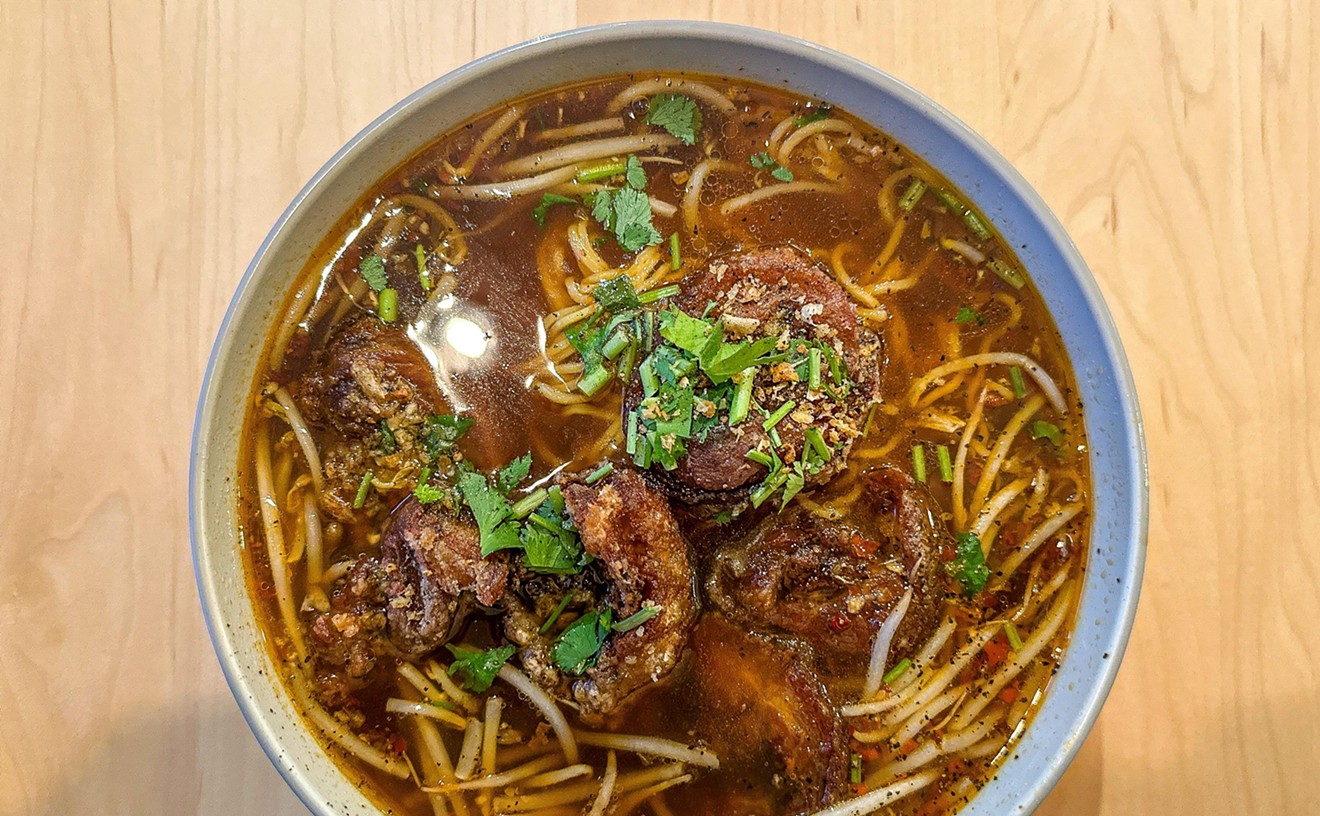Last night, Iron Fork took over Centennial Hall at Fair Park, with 2,093 hungry Dallasites scurrying from booth to booth, filling up on food and booze. There were definitely some memorable bites. Flavors Indian Restaurant in Addison served up a phenomenal spread with veggie samosas and other tasty Indian dishes, and Whisk Crepes whipped up a beautiful little bite of berry crepe goodness. As usual, Scardello's table served up easy but glorious bites of artisan cheese — Toma, the Stag and Emmentaler "Slow Food," to be cheese-specific.
The booth with the longest line all night: Buku Modernist Cuisine, a forthcoming Frisco restaurant that broke ground April 1. After stepping up to the elaborate setup, I was handed the most indulgent slice of jamon iberico, offered several food and drink options and greeted by nearly a dozen friendly employees. It's no surprise that Buku won best booth of the night. Pouring La Socarrada, a not-exactly-cheap Spanish rosemary beer, was a classy touch. I'll be keeping an eye on this place.
But most of my night was spent at the judges' table, where Brian Luscher (The Grape, Luscher's Red Hots), Michael Marusak (Whole Foods) and I took in a show as Blind Butcher's Oliver Sitrin and Julia Pearl's Jermaine Brown faced off in a 30-minute cooking contest moderated by chef Kent Rathbun. They were given ample Whole Foods ingredients and one key ingredient that had to be included: seasonal berries.
Half an hour isn't a terribly long time to produce two dishes meant to wow three judges, but Sitrin and Brown were up to the task. They looked a bit flustered in some moments, but their output was admirable. Sitrin served up snapper crudo with berry coulis, an incredible bite of French toast with fresh berries and coulis and a bonus dish of berry-glazed chicken wings. Brown served up scallops in a berry sauce with couscous and a flank steak dish with berry-bourbon barbecue sauce.
Brown's scallop dish was beautiful, for sure, but his flank steak was a bit chewy. Sitrin's French toast was the standout dish of the night. It tasted more like eating a French toast-flavored cloud than any ho-hum diner fare.
Ever since Iron Chef and MasterChef — and myriad cooking contest shows that followed — the chef throw-down has become a full-blown American phenomena. Why do we love watching chefs sweat while they try to create something palatable, something that we, the viewer, generally can't even eat? Well, we watch burly dudes beat the living hell out of each other in football stadiums, so why not watch some chefs go at it?
But how do you judge a competition like this? After last night, I've got some tips:
1. "The secret to being a good judge is not being an asshole," Luscher said. "The secret is no real secret, actually; it is to critique while being fully objective, approaching the item or actions to be judged with a comprehensive understanding of what is being judged and why. Two kick-ass chefs being thrown a last-second mystery ingredient needed to prepare two dishes to be scrutinized in under 30 minutes. I am not going to apply the same criteria one might employ whilst judging , say, the Bocuse d'Or or proctoring an ACF Master Chef Certification."
Don't be an asshole is, in general, just good advice, but Luscher is particularly good at following through on that credo. He's also good at the second most important system for judging a food competition.
2. Get drunk. Some people take these events very seriously — too seriously. In doing so, you miss the point of the whole damn thing — and you won't have very much fun.
3. Eating and tasting are two very different things, and if you've been gorging all night at the Scardello booth, not only will food cease to seem appetizing, but you'll experience palate fatigue as well. And palate fatigue is very real. It becomes much harder to form an opinion or make a decision when you've overwhelmed your sense of taste. Moderation is one of the most important lessons you'll learn in the food industry.
These obvious little nuggets of advice are really the biggest things I'd pass along to my children, if I had any. Life is short, and the world can be a very unkind place. Don't be an asshole, never stop having fun and learn moderation in all things. And if possible, judge a food competition sometime — it's sure not a bad way to pass the time.
[
{
"name": "Air - MediumRectangle - Inline Content - Mobile Display Size",
"component": "18855504",
"insertPoint": "2",
"requiredCountToDisplay": "2"
},{
"name": "Editor Picks",
"component": "17105533",
"insertPoint": "4",
"requiredCountToDisplay": "1"
},{
"name": "Inline Links",
"component": "18349797",
"insertPoint": "8th",
"startingPoint": 8,
"requiredCountToDisplay": "7",
"maxInsertions": 25
},{
"name": "Air - MediumRectangle - Combo - Inline Content",
"component": "17105532",
"insertPoint": "8th",
"startingPoint": 8,
"requiredCountToDisplay": "7",
"maxInsertions": 25
},{
"name": "Inline Links",
"component": "18349797",
"insertPoint": "8th",
"startingPoint": 12,
"requiredCountToDisplay": "11",
"maxInsertions": 25
},{
"name": "Air - Leaderboard Tower - Combo - Inline Content",
"component": "17105535",
"insertPoint": "8th",
"startingPoint": 12,
"requiredCountToDisplay": "11",
"maxInsertions": 25
}
]











